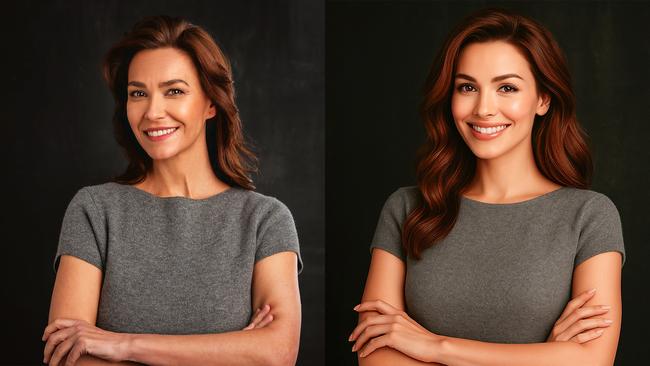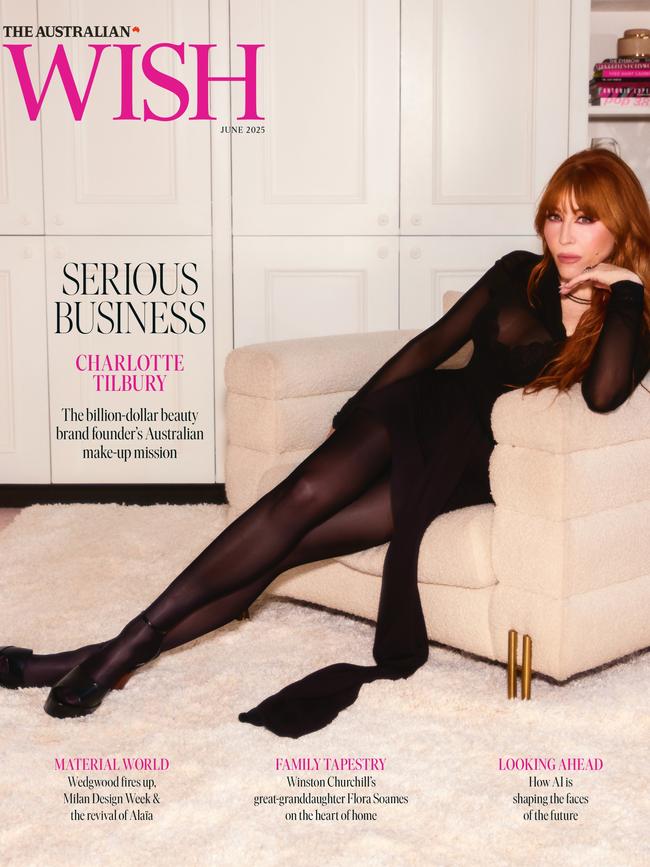The AI beauty revolution is shaping the future of faces
Experts predict the trends, ideals and innovations – from gene-mapping to hyper-individualism – defining the evolution of beauty.

You wake up at 6.18am on a typical Monday in 2045. There’s no alarm; you don’t need it, thanks to the circadian lighting in your bedroom, which is constantly recalibrating to optimise your sleep cycle. A decade ago, you couldn’t think of doing anything before coffee, but that was before the bioregenerative tech boom. These days, your energy levels are as robust as your 50-year-old skin.
You triple check this, though, via the personal diagnostic console on your bathroom vanity. In seconds, the AI-powered device assesses your skin’s hydration, collagen density, microbiome balance and hormonal fluctuations, before adjusting your skincare and supplement regimen for the day.
Your skin isn’t flawless, but it looks healthy, vibrant, and much more youthful than your mother’s was at the same age; the result of a decade using regenerative treatments such as personalised peptides, light therapy and “collagen banking”.
And while she’s barely 19, your daughter has already begun her own preventative health and beauty regimen that includes microbiome mapping, AI-personalised “prejuvenation” and wearable tech that monitors everything from her sleep and hormonal cycles to her skin elasticity.
This scenario may seem more in the realm of science fiction, but with the recent acceleration of AI and its growing application in biotech, it could in fact become reality sooner than we think. With technology already having a major influence on beauty ideals and consumption, how will other forces – such as biology, culture, and the timeless human desire for status, belonging and identity – influence the concept of beauty in the decades to come?
Don’t miss your copy of the June issue of WISH magazine in The Australian out today
As evolutionary psychologist Dr Brendan Zietsch points out, what we find attractive is influenced by social and cultural trends, “but there are also cross-cultural consistencies that indicate that we are evolved to find certain traits attractive”. The University of Queensland researcher cites the reasons for this are likely evolutionary, and linked to “health, fertility, genetic quality, or ability to provide resources”.
As beauty ideals continue to evolve, they are splintering into a mosaic of microtrends, personalised rituals and shifting social values.
“In the next 10 to 20 years, the concept of beauty will shift significantly towards celebrating individuality,” says Dr Josh Wall, co-founder and medical director of Contour Clinics. “We’re already starting to move away from rigid standards and towards appreciating unique characteristics.” While features such as lifted brows, defined cheekbones and youthful skin remain desirable, the emphasis is changing. “Future beauty standards will emphasise preserving and enhancing natural features, not dramatically changing facial structure to fit a single ideal,” Wall says.
Instead, the beauty experience is becoming hyper tailored. AI already delivers personalised skincare routines and is rapidly advancing to offer predictive, full-body beauty and health maintenance plans. This is where aesthetics will merge with longevity science; where personal appearance will no longer just be about looking young, but about maintaining vitality at every life stage. “Increasingly, aesthetic enhancement will be viewed through a lens of overall wellness and vitality,” Wall explains. “The health of your skin often reflects your general health, and future treatments will combine regenerative therapies, AI-driven personal recommendations and possibly even gene editing.”
Jen Li, senior trend specialist at WGSN, sees the same convergence driving new rituals and cultural shifts. “The idea of beauty will go back to celebrating inner wellness – both mental and physical,” she says. Li predicts that beauty products and services will become “whole-istic”, recognising physical, emotional and even spiritual wellbeing. Treatments that once seemed futuristic are already gaining traction: microbiome rebalancing, exosome therapy and hormonal synchronisation. Li says the next decade will see more beauty routines designed around the body’s natural circadian rhythms and hormonal cycles, combining “sleep-hacking ingredients, longevity-supporting supplements, and ‘clean-ical actives’ that align with each life stage”.

For younger consumers – especially members of Generations Z and Alpha – this holistic, personalised approach isn’t just an option; it’s an expectation. “These generations are driving a shift away from artificial ideals and towards celebrating what’s genuinely unique and real,” says Wall. “Unlike older generations who were excited by artificial or digital presentations, they value authenticity and individual expression.” Li agrees, noting that younger consumers increasingly reject the notion of “anti-ageing” in favour of “slow-ageing” and products that support longevity. “Flaws are no longer flaws – they’re part of the story,” she says.
But the embrace of authenticity hasn’t diminished the desire to optimise. In fact, it has made personalisation even more crucial. Social media is fuelling what senior lecturer in cultural studies Dr Hannah McCann describes as “nicheification” – a fragmentation of beauty ideals, where “instead of one dominant ideal, there are countless micro-trends people align with”.
Li also notes that consumers are seeking products and treatments that not only suit their skin and biology but reflect their identities, hobbies and communities. “We’re seeing the rise of beauty tribes such as ‘ath-beauty’, where people choose skincare and treatments that complement their running routines or post-workout recovery,” she says. In the future, your beauty ritual will be as much about lifestyle alignment as aesthetics.
While these advances promise greater choice and empowerment, psychologist Amy Brown warns they could also amplify perfectionism and psychological strain. “Our brains are wired to measure ourselves against others,” she explains. “When we’re constantly exposed to images of filtered, enhanced or modified faces as the norm, our brain starts to interpret those as the baseline.” Even with more diverse and inclusive ideals, the subtle pressure to optimise can be relentless. “Chasing agelessness becomes just another impossible standard, leaving many women anxious, burnt out and never feeling good enough.”
Brown fears that without real-world examples of confident, authentic ageing, future generations may develop even stronger perfectionistic tendencies and lower self-esteem.
Still, there are clear signs that consumers are beginning to set their own boundaries. Demand is growing for non-invasive, natural-looking “tweakments”, while treatments such as collagen banking – maintaining and restoring the skin’s youthful levels of collagen production – ingestible supplements and advanced at-home beauty technology have moved firmly into the mainstream. As Wall observes, “The future of aesthetic enhancement will align closely with longevity medicine, taking a more holistic approach focused on overall health optimisation.”
Some experts anticipate a radical shift in what Western society will define as desirable. Sanja Maria, owner of Sydney cosmetic clinic Face by SM, predicts that by 2045 signs of ageing such as silver hair, skin with texture and fine lines may be viewed not as flaws but as aspirational markers of vitality and experience.
“Ultimately, the features people will value most are those that feel authentic, timeless and unique to them,” she says.
Of course, the collective human desire to feel attractive and valued won’t vanish. But as Li puts it, the beauty experience will increasingly be about “crafting an aesthetic that aligns with your personal values, lifestyle and the story you want to tell the world”. Like culture itself, beauty will continue to evolve but with greater autonomy than ever before over how we look, how we age, and how beautiful we feel.
This story is from the June issue of WISH.




To join the conversation, please log in. Don't have an account? Register
Join the conversation, you are commenting as Logout